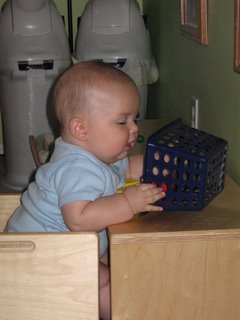After our first discussion of concentration in my Montessori training, I began to notice how little we respect this sign of engagement in everyday life. I caught myself regularly interrupting my husband, my students, and my colleagues in spite of the clear signs they gave that they were focused and intent on accomplishing something else - the fixed gaze, the lack of extraneous movement, the quiet dedication to the task at hand. I also began to notice how I felt during those moments when I was interrupted. None of the words I would use - irritated, frustrated, distracted - are pleasant.
However, as an adult, I was generally able to handle the distraction and pick up where I had left off. This can be much more difficult to a young child who is just learning to focus his attention. Even well-meaning interruptions, such as praise, can be detrimental to this developing skill. What does he learn when we constantly interrupt? He learns that engaging with an activity will only result in frustration, because as soon as you get hooked, someone will come along and scoop you up or distract you.
From the time Alex was born, I have worked hard to recognize and protect his moments of concentration. It is a challenge, and one I have probably failed at a million times. It is so easy as the adult to put my priorities first. If he is working with a toy or staring at picture and I want to go to the store, I could so easily pull him away from what he is doing. Yet concentration indicates that what he is doing is exactly what his developing body or psyche needs at that moment.
Protecting concentration does even more than assist the child in his development; it demonstrates respect. It tells him that his work and his interests are important. Even beyond that, it signifies that I recognize his needs as equal to my own. Thus, whenever I see those little eyes locked in and sense that quiet determination, I pause, watch, and marvel.

I absolutely agree on the concentration issue. Often I have to pull myself back from 'helping' (ie: disrupting)DD when she is in this mode of concentration and remind myself to respect her right to independent play/exploration (is there a difference between the two?).
ReplyDeleteOne of the more difficult issues I have found myself dealing with is being able to judge when she may need genuine assistance oand when she may be experiencing frustration that has a productive end (eg: figuring out how a toy will produce that satisfying noise). I find this an ongoing challenge, but feel that with her burgeoning verbal skills we will soon be able to communicate a bit better about when I am needed or not.
Cheers, Cass
I agree with the challenge to determine at what level of frustration to become involved. . .some frustration is so important to the learning process. I'm trying very hard to let her seek me out when she wants more help. I've seen my efforts pay off in some interesting ways - one being that I'm much less interfering with my husband when he's expressing frustration as well. Maybe it was a lesson I needed to learn all around and not just with my daughter! (funny how that works, isn't it?)
ReplyDeleteI'm so happy to have found this blog! I am looking for more Montessori resources for helping my 10 month old. So far, I've only been able to read Montessori from the Start. This website is greatly appreciated, as I know Montessori equipment and training are a bit pricey. So far, my daughter made a breakthrough today by learning how to eat with a spoon! (And yes it required a lot of concentration) If I my daughter was able to achieve this by my reading one book, I am sure we are bound to see more Montessori progress from reading your experiences. Thanks so much!
ReplyDelete